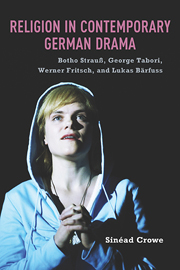 Religion in Contemporary German Drama
Religion in Contemporary German Drama Book contents
- Frontmatter
- Contents
- Acknowledgments
- Introduction: Definitions and Themes
- 1 The Relationship between Theater and Religion
- 2 Religion in Modern European Theater and Drama
- 3 “No One Wants to Get to God Anymore”? Botho Strauß's Groß und klein and Die eine und die andere
- 4 Theological Farce: George Tabori's Mein Kampf
- 5 “The Last Refuge for Metaphysics”: Werner Fritsch's Theater Theory
- 6 “The Feeling of Faith”: Fritsch's Wondreber Totentanz and Aller Seelen
- 7 Belief and Unbelief in the Twenty-First Century: Lukas Bärfuss's Der Bus (Das Zeug einer Heiligen)
- Conclusion
- Bibliography
- Index
Conclusion
Published online by Cambridge University Press: 05 May 2013
- Frontmatter
- Contents
- Acknowledgments
- Introduction: Definitions and Themes
- 1 The Relationship between Theater and Religion
- 2 Religion in Modern European Theater and Drama
- 3 “No One Wants to Get to God Anymore”? Botho Strauß's Groß und klein and Die eine und die andere
- 4 Theological Farce: George Tabori's Mein Kampf
- 5 “The Last Refuge for Metaphysics”: Werner Fritsch's Theater Theory
- 6 “The Feeling of Faith”: Fritsch's Wondreber Totentanz and Aller Seelen
- 7 Belief and Unbelief in the Twenty-First Century: Lukas Bärfuss's Der Bus (Das Zeug einer Heiligen)
- Conclusion
- Bibliography
- Index
Summary
THE DEPARTURE POINT of this study was that religion did not “return” to German theater of the 2000s, as has been widely claimed. I identified several major works from the past four decades in which religion plays a prominent role. This role is complex and variegated, however. We have seen that a wide variety of dimensions of religion are invoked, including its beliefs, practices, myths, ethics, and experiential aspects, across various elements of theater, from its themes, forms, language, and characters to aspects of its mise en scène. Furthermore, religious elements serve a broad range of aesthetic, theatrical, and dramaturgical ends, some of which have little to do with religion itself.
If we are to identify one common thread linking the contemporary theatrical texts I have selected for analysis, though, it is this: they share the assumption that traditional religious forms are no longer able to cater for Western needs. The works of Botho Strauß, George Tabori, and Werner Fritsch all portray the Judeo-Christian God as a figure who is unfit for the modern world and unable to offer solutions for the existential, spiritual, or ethical crises experienced today. Strauß depicts God as a social misfit, and the basic position explored in certain of his plays from the 1970s to the present day is that postindustrial German society is a disenchanted place where religion survives, for the most part, only in a set of empty clichés: what Adorno, in reference to Beckett's Endgame, called “cultural trash.”
- Type
- Chapter
- Information
- Religion in Contemporary German DramaBotho Strauß, George Tabori, Werner Fritsch, and Lukas Bärfuss, pp. 143 - 146Publisher: Boydell & BrewerPrint publication year: 2013
